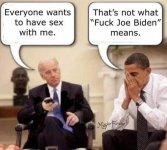- Joined
- Apr 8, 2014
- Messages
- 13,800
- Reaction score
- 6,385
- Points
- 113
That is false. THis Country was founded on Christian principles not on Muslim principles. No where in the Constitution will you will find the term separation of church and State. The Bill of rights only prohibits the forming an official State Church like what Britain had and was meant to leave that up to the individual States. The framers never meant for Religion to not be a guiding principle in making laws in fact it is almost impossible to State that you can.
Interesting to read into this.

Is America A Christian Nation?
Is the United States a "Christian nation"? Some Americans think so. Religious Right activists and right-wing television preachers often claim that the United States was founded to be a Christian nation. Even some politicians agree. If the people who make this assertion are merely saying that...
The U.S. Constitution is a wholly secular document. It contains no mention of Christianity or Jesus Christ. In fact, the Constitution refers to religion only twice in the First Amendment, which bars laws "respecting an establishment of religion or prohibiting the free exercise thereof," and in Article VI, which prohibits "religious tests" for public office. Both of these provisions are evidence that the country was not founded as officially Christian.

The Founding Fathers, Deism, and Christianity
For some time the question of the religious faith of the Founding Fathers has generated a culture war in the United States. Scholars trained in research universities have generally argued that the majority of the Founders were religious rationalists or Unitarians. Pastors and other writers who
www.britannica.com
Although no examination of history can capture the inner faith of any person, these four indicators can help locate the Founders on the religious spectrum. Ethan Allen, for example, appears clearly to have been a non-Christian Deist. James Monroe, a close friend of Paine, remained officially an Episcopalian but may have stood closer to non-Christian Deism than to Christian Deism. Founders who fall into the category of Christian Deists include Washington (whose dedication to Christianity was clear in his own mind), John Adams, and, with some qualifications, Thomas Jefferson. Jefferson was more influenced by the reason-centred Enlightenment than either Adams or Washington. Orthodox Christians among the Founders include the staunchly Calvinistic Samuel Adams. John Jay (who served as president of the American Bible Society), Elias Boudinot (who wrote a book on the imminent Second Coming of Jesus), and Patrick Henry (who distributed religious tracts while riding circuit as a lawyer) clearly believed in Evangelical Christianity.
Although orthodox Christians participated at every stage of the new republic, Deism influenced a majority of the Founders. The movement opposed barriers to moral improvement and to social justice. It stood for rational inquiry, for skepticism about dogma and mystery, and for religious toleration. Many of its adherents advocated universal education, freedom of the press, and separation of church and state. If the nation owes much to the Judeo-Christian tradition, it is also indebted to Deism, a movement of reason and equality that influenced the Founding Fathers to embrace liberal political ideals remarkable for their time.







